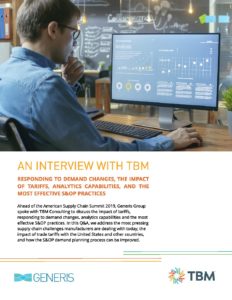Responding to Demand Changes, the Impact of Tariffs, Analytics Capabilities, and the Most Effective S&OP Practices
Ahead of the American Supply Chain Summit 2019, we spoke with TBM Consulting to discuss the impact of tariffs, responding to demand changes, analytics capabilities, and the most effective S&OP practices. In this Q&A, we address the most pressing supply chain challenges manufacturers are dealing with today, the impact of trade tariffs with the United States and other countries, and how the S&OP demand planning process can be improved.
Here is an excerpt from the interview we did with TBM Consulting:
“What are the most pressing supply chain challenges that manufacturers are dealing with today? What are the most effective tactics for addressing those challenges?
The global economy is increasingly dynamic and volatile. Manufacturers must be responsive. They need to be agile. That word has been tossed around for years now, decades really, but that doesn’t make it any less important.
Some companies can rapidly flex their supply chains in response to changes in customer demand, ramping up or ramping down their manufacturing activity. But most manufacturers still have a lot of work they could do in this area.
With all of the talk about the potential for the next recession, manufacturers need to prepare for the possibility of a downturn while continuing to manage growth, which is where they’ve been focused for a number of years now. If there’s a steep decline in business volume, how prepared is your supply chain to respond?
Analytical capabilities and what-if modelling can really help here. If demand dropped by 20%, what should you do? Should you cut a shift? Should you shut down a plant? Operations leaders can use analytics and scenario analysis to think about what they might do so they’re not stuck figuring it out after it happens. Those companies that have thought through their strategy and modelled various scenarios will be ready to take action if demand does decline.”
Click through to access the full Q&A e-book here.

%20(1).png?width=773&height=112&name=Generis%20Logo%20full%20Colour%20(Large)%20(1).png)

.png)
-2.png)
